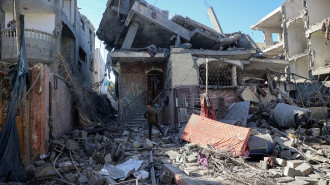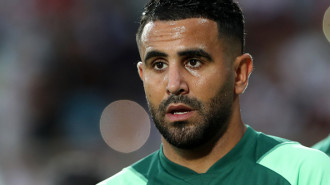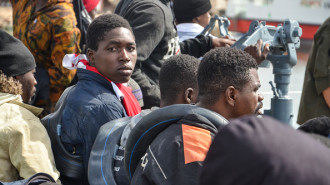EU to deploy new force to man Europe's borders
EU to deploy new force to man Europe's borders
The European Union is stepping up its efforts to restrict refugees entering its borders with the deployment of a new border and coastguard force.
2 min read
More than a million refugees have crossed into Europe since 2015 [Getty]
A new EU border and coastguard force set-up to help countries hit by a massive influx of refugees could be ready to man Europe's borders within a couple of months.
EU ministers have already agreed to the plan, and if the proposal is accepted by the European Parliament in June then the force could be deployed during summer.
"Today, the council has reached an agreement on the European border and coastguard," EU Migration Commissioner Dimitris Avramopoulos told a news conference shortly after minsters met in Luxembourg.
"If we keep up this pace I have confidence we will be able to finalise the legislative process by June."
This is viewed - in part - as an admission of failure in December's controversial EU-Turkey deal.
Turkey has threatened to tear up the agreement, leading the European Council head Donald Tusk to warn that Europe is being blackmailed by Ankara.
"Our helplessness would provoke temptations to blackmail Europe and forcing through far-reaching concessions. Too often I have heard from our neighbours that Europe must concede, otherwise it will be flooded by a migration wave. I realised then that cooperation will be partner-like only when we regain the ability to control migration flow," he wrote in an article on Friday.
Nations affected most heavily - including Greece - are expected to give their full consent to the force which would be able to intervene within its borders following the host country's consent.
"National sovereignty is not threatened by this initiative - on the contrary," Avramopoulos said. "I would say it will intervene always with the approval of the member state."
Borders between EU countries were eliminated years ago as part of the Schengen policy. However, several nations have recently implemented barriers on the border in an attempt to control the numbers of refugees entering.
The refugee crisis has been labelled the worst humanitarian disaster since the Second World War, and has sparked fierce disagreements between EU members, bringing the bloc's system of open borders to the brink of collapse.
More than one million people crossed clandestinely from Turkey to Greece in 2015, and some 150,000 have made the trip since the start of this year, with over 700 dying while trying to do so.
Earlier this week, more than 400 people drowned in the Mediterranean Sea while trying to reach Europe after their boat capsized off the coast of Egypt.
EU ministers have already agreed to the plan, and if the proposal is accepted by the European Parliament in June then the force could be deployed during summer.
"Today, the council has reached an agreement on the European border and coastguard," EU Migration Commissioner Dimitris Avramopoulos told a news conference shortly after minsters met in Luxembourg.
"If we keep up this pace I have confidence we will be able to finalise the legislative process by June."
This is viewed - in part - as an admission of failure in December's controversial EU-Turkey deal.
Turkey has threatened to tear up the agreement, leading the European Council head Donald Tusk to warn that Europe is being blackmailed by Ankara.
"Our helplessness would provoke temptations to blackmail Europe and forcing through far-reaching concessions. Too often I have heard from our neighbours that Europe must concede, otherwise it will be flooded by a migration wave. I realised then that cooperation will be partner-like only when we regain the ability to control migration flow," he wrote in an article on Friday.
Nations affected most heavily - including Greece - are expected to give their full consent to the force which would be able to intervene within its borders following the host country's consent.
 |
Our helplessness would provoke temptations to blackmail Europe and forcing through far-reaching concessions. - Donald Tusk, European Council president |
 |
"National sovereignty is not threatened by this initiative - on the contrary," Avramopoulos said. "I would say it will intervene always with the approval of the member state."
Borders between EU countries were eliminated years ago as part of the Schengen policy. However, several nations have recently implemented barriers on the border in an attempt to control the numbers of refugees entering.
The refugee crisis has been labelled the worst humanitarian disaster since the Second World War, and has sparked fierce disagreements between EU members, bringing the bloc's system of open borders to the brink of collapse.
More than one million people crossed clandestinely from Turkey to Greece in 2015, and some 150,000 have made the trip since the start of this year, with over 700 dying while trying to do so.
Earlier this week, more than 400 people drowned in the Mediterranean Sea while trying to reach Europe after their boat capsized off the coast of Egypt.







 Follow the Middle East's top stories in English at The New Arab on Google News
Follow the Middle East's top stories in English at The New Arab on Google News


